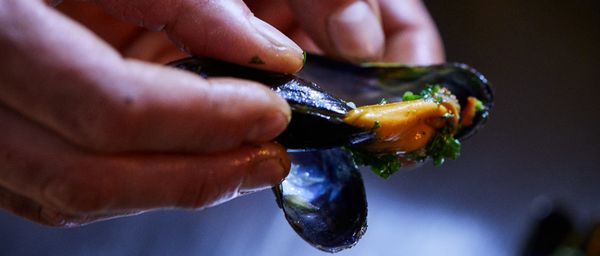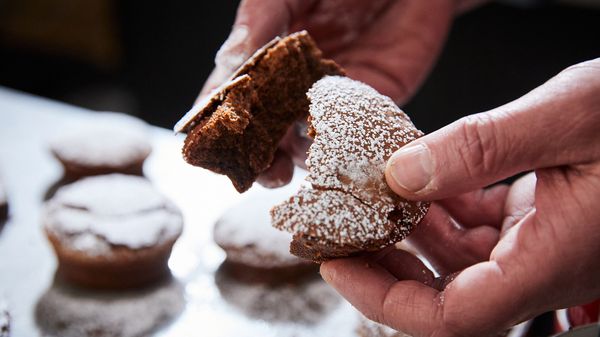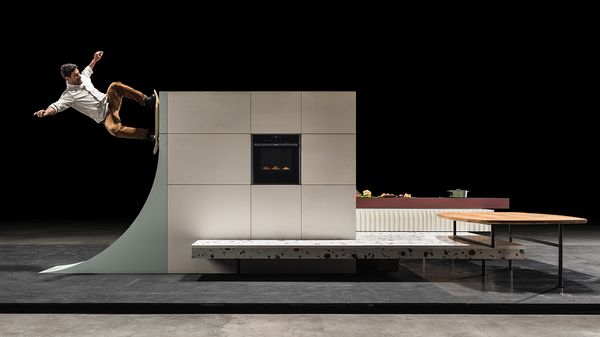Particularly in hard times like the coronavirus lockdown, we call to mind the essentials and ask ourselves what is really important in life. We are searching for authenticity, for real (culinary) experiences in a world that is increasingly in danger of reaching its limits. There is a growing desire to counter the globalised fickleness with a distinctive signature. The new generation wants to reclaim the freedom to shape their lives in the kitchen with sustainable and regional farming, with authentic cuisine and with kitchen design tailored to their needs.
Their mantra: good food no longer has anything to do with luxury. Status symbols are merely a distraction from authentic cuisine and good taste. There is a demand for perfect provenance, artisanal intelligence and creativity. After all, cooking in its original form is the opposite of consumption – it is pure creativity. It also unleashes emotions and can bring people together. In this regard, people like to turn to old cooking techniques like fermenting, smoking and preserving, which are primarily possible with something of which we have had far too little for far too long: time.
Against this background, we have brought people together who contemplate the role they wish to play in making the world a little better, brighter, nicer and more sustainable and human.

WHAT MAKES SENSE AND IS SUSTAINABLE? HOW WOULD I LIKE TO LIVE? A ROUND-TABLE DISCUSSION ABOUT THE KITCHEN OF THE FUTURE.
Four protagonists are talking about the meaning of cooking in these days...
Holger Schardt: The designer from Marketstudios thinks of ways in which design (in the kitchen) can generate an even more sustainable response. WWW.MARKETSTUDIOS.DE
Neele Grünberg: Together with two partners, Neele has devised a fascinating integral concept: a market hall for regional and seasonal culinary delights. WWW.HOBENKOEOEK.DE
Jost Becken: Joost is one of two oyster fishermen who sell fresh and sustainably sourced oysters from the North Sea at weekly markets. WWW.AUSTERREGION.DE
Giuseppe Messina: Giuseppe is an Italo-German chef dedicated to conscious cuisine and wants to tell stories and move people with his dishes. WWW.GIUSEPPEMESSINA.DE
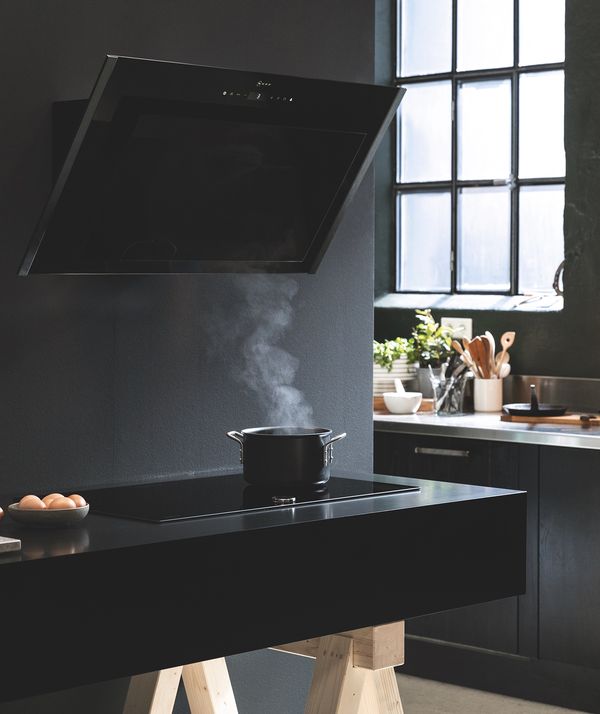
WHAT DO WE ASSOCIATE WITH CUISINE AND COOKING NOWADAYS?
HOLGER SCHARDT: For many people, the focus is now clearly on the entire package. Particularly for people who generally set themselves high standards and have the same standards in relation to their job and their family. They are looking for complete solutions, for different lifestyles. Living in harmony with nature is one key aspect that is also reflected in the kitchen. All other rooms have their various functions and are more or less personalised, but you can tell somebody’s attitude to life from the kind of kitchen they have. How do I like to eat? Where do I shop? How sustainably would I like to live? The kitchen is traditionally a highly technical room and mostly associated with a considerable amount of investment. We have seen how important it is for people to create a perfect place here – the perfect workshop, a central meeting point for the whole family, but also an expression of their personality. The kitchen should not only be able to cater to these needs from a technical standpoint, but also in terms of its looks. And it should also feel like a place that can meet these needs.
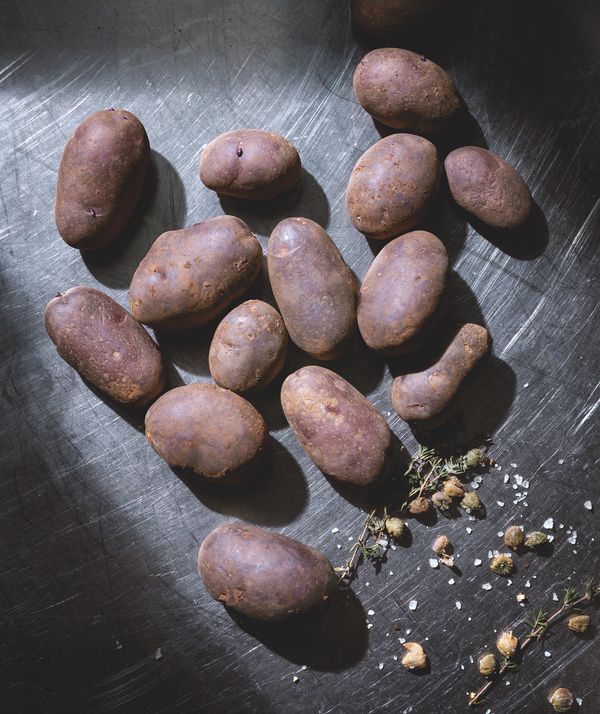
ARE THERE SIGNS OF A PARADIGM SHIFT IN TERMS OF SUSTAINABILITY?
NEELE GRÜNBERG: Definitely! This is also reflected in our food concept. We know where our produce comes from. Our sources include many an old family-run business that has always traditionally grown organic produce, but it would be too expensive for them to obtain organic certification for it. Greater sustainability doesn’t necessarily need an official seal. We show with our products that we can embrace regionality, that there are old potato and vegetable varieties and fantastic old fruit varieties. You don’t usually find such things. This is special produce and it connects us with special people. We visit these people personally and maintain close dialogue with them.
GIUSEPPE MESSINA: I agree. We are now seeing a trend towards regionality as if it were some groundbreaking idea. I was talking to an older colleague who was a chef in a little restaurant in the Abruzzi region. She herself grew lentils that even came to the attention of the committee responsible for legumes as part of the Slow Food movement founded by Carlo Petrini. Organic food was not a new movement to her. She has spent her whole life growing these lentils without chemical additives. We once had all of this and then abandoned it because we had other objectives. The art of cooking fell into decline due to a lack of time and the convenience trend took off. The food industry has shaped our way of thinking with messages such as ‘Make it easier for yourself, then you will have more time to spend on you’.
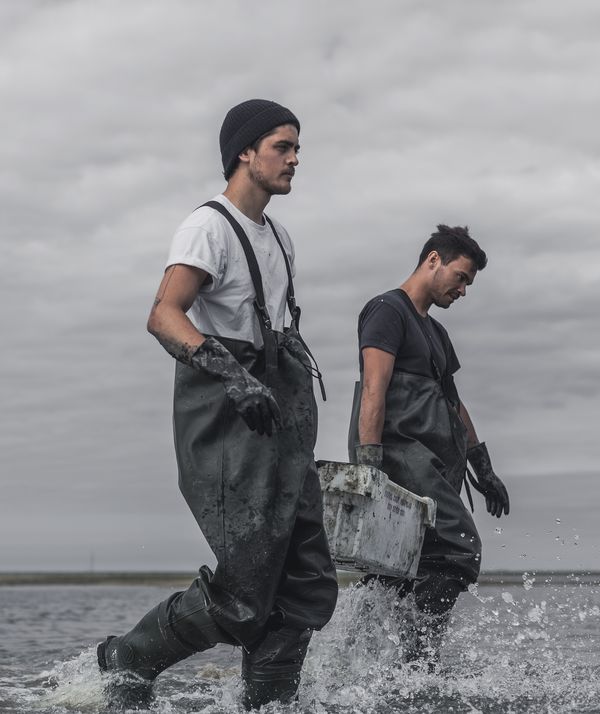
IS THERE NOW A MOVE AWAY FROM THE PURE TIME-SAVING FACTOR BACK TOWARDS OTHER VALUES?
JOOST BECKEN: There is definitely a growing interest in such values. My business partner Marco and I have had a clear focus on sustainable activities for some time now. Even while studying – also specialising in sustainability, by the way – we were involved in food sharing. It is sustainable, but takes a great deal of effort – certainly not a way of saving time. You have to collect the food at a set time. We fed our flat-sharing communities with it. Sometimes we had ten leeks in the kitchen. Rather than throw them in the bin, we preferred to give them away to our neighbours. This concept of making good use of things is deeply rooted within us.
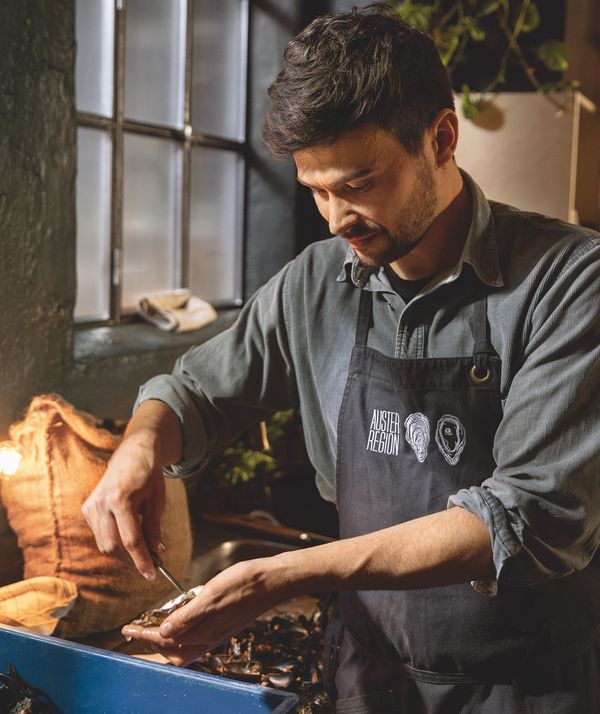
WHICH NOW ALSO FORMS THE BASIS OF YOUR BUSINESS MODEL …
JOOST: Exactly. We are both in the fish trade and were at the fish trade fair in Bremen. There, among all the major players in the fish business, stood a couple of people from Holland surrounded by sacks full of oysters. Their stand looked pretty ordinary, but their philosophy totally won us over. The pair gather the Pacific oysters on the Dutch North Sea coast. The oyster has the ideal environment necessary for growth because it feeds on plankton, which is in plentiful supply on the mudflats. We collect the goods several times a week and sell them directly at regional weekly markets and also sell them to restaurants that have pre-ordered them. It doesn’t get any more sustainable than that.
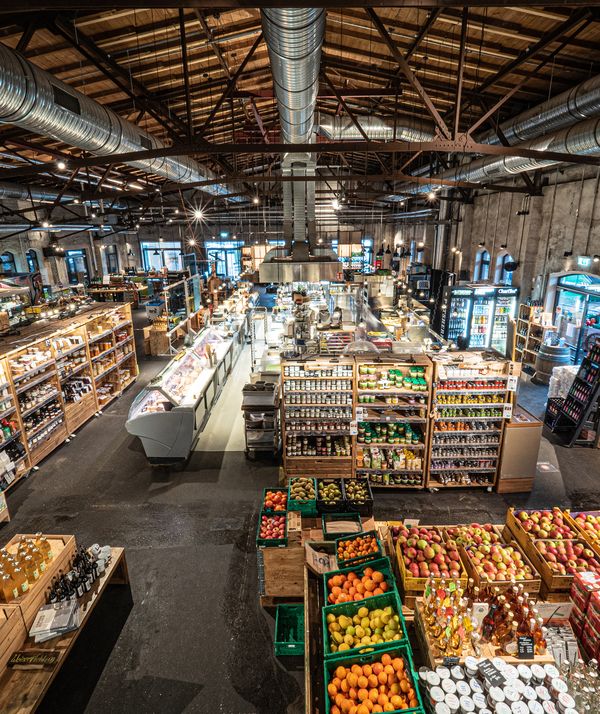
HAS THERE BEEN A SHIFT TOWARDS MORE ATTENTIVENESS DURING THE CORONAVIRUS PANDEMIC?
NEELE: Yes, more attentiveness and more togetherness. When the lockdown came, we decided on the spur of the moment to keep the market hall open. Behind us are a number of producers who were happy and relieved that we have taken their goods off their hands, because they were no longer able to sell them to restaurants. Many customers have really appreciated our efforts. And further creative ideas have emerged as a result of the even closer dialogue with our traders: we have made tomato sauce with the producers from the Vierlande region and a special Bolognese sauce with a producer located on the Mecklenburg-Western Pomeranian border. And we have pickled plenty of produce: beetroot, red cabbage, kale, kohlrabi, to name but a few examples.
GIUSEPPE: It is actually the old methods such as fermenting, smoking and preserving that have been rediscovered. In times like these, maybe people return to their roots. It elicits the happy feelings they once had whenever they paid a visit to grandma and she cooked their favourite dish. Who still has a favourite dish these days? This has something to do with the idyllic world people perceived when they were children and particularly miss in such times as these. Food is a really big indicator of love, affection and appreciation.
HOLGER: This is also noticeable in the kitchen. The kitchen has always been a hive of activity. What is new, however, is the fact that it is no longer the domain of the housewife and mother. It is increasingly becoming a place that people wish to shape together. And the digital world has long since found its way in. Even if the kitchen has generally become more a piece of furniture – the technology is visible and wishes to remain so. Yet it is also getting better, more human and simpler to use, making it the perfect partner. It is the helper that makes many things easier and enables even more people to cook really well.
GIUSEPPE: The entire story of our evolution took place in the kitchen, around the fire. Culinary art in turn evolved from this. Cooks have played a key role in shaping our very existence. The result is a civilised world in which people no longer have to hunt or gather.
JOOST: We still do that: gather. Sourcing goods regionally, however, is hard work. We try to sell everything we have at the weekend. We don’t have our own warehouse where we can temporarily store our goods. Maybe that is the reason why we have no competitors. Who would subject themselves to such stress? It is 95 per cent hard graft and five per cent romance. In our experience, however, the people especially like it when you specialise in something. Specialising in something that is perfect, that is the future.
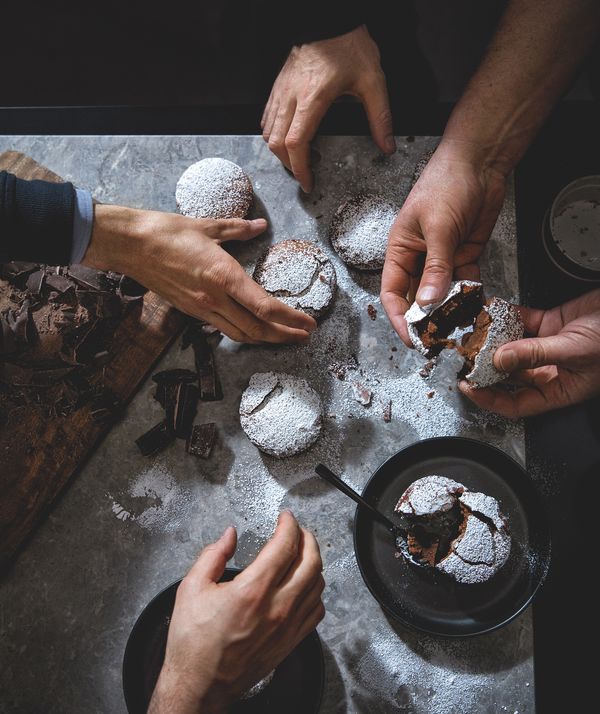
WHAT MOTIVATES THE REST OF YOU? WHERE IS THIS JOURNEY HEADING?
HOLGER: There has been a rethink, with a desire to concentrate on the essentials. What can I create by myself? What could I do by myself with my skills? Which three things can I use to make something on which I could live? This inner attitude is also reflected in the design of the kitchen. If I am a vegan, then you can easily tell from the kitchen. If I am a meat lover, the griddle plate can definitely be a central element. The identification has a deeper meaning than before. The focus is no longer on outside appearances – getting out the ‘good crockery’ for special occasions – but about the attentiveness on a day-to-day basis. People make conscious decisions and it has to be authentic. They have to be able to find themselves.
GIUSEPPE: I want the best product for my guests and I want to use the finest and most creative preparation methods. As a chef, I am driven by the desire to play with flavours and textures. With new preparation forms and consistencies. But I also love classic dishes, like my grandmother’s classic recipe for gnocchi. That feeds the soul. I would never change that. Emotions have shaped me. There is no nicer compliment than when somebody says to me: ‘That dish reminded me of my childhood.’ I think it would be really good if there were more street food. I wish it were possible to find better quality for less money. It has to be honest, simply good, honest, affordable food, like they sell in my native Sicily.
NEELE: It is great to make things happen and develop on a personal level. Lots of things are happening in this regard. We are currently planning our own greenhouses, which we will manage ourselves. Here in the Oberhafen quarter there are many different creative people who cover all areas of the creative economy. We are living the pure life. Our urban gardening project in the Oberhafen quarter will be open to everyone. It is a fantastic area, a former railway line with the largest covered hall in Hamburg. A great deal is going to happen here over the coming years.
JOOST: It took a really long time before we earned any money. We were so keen to make things happen that we just accepted it all. Now we are slowly getting more secure and generating a more stable turnover. We would like to expand the concept nationwide. Due to the goods and the availability, we could supply the whole of Germany. But how regional is it still when people in Munich are eating our oysters?
